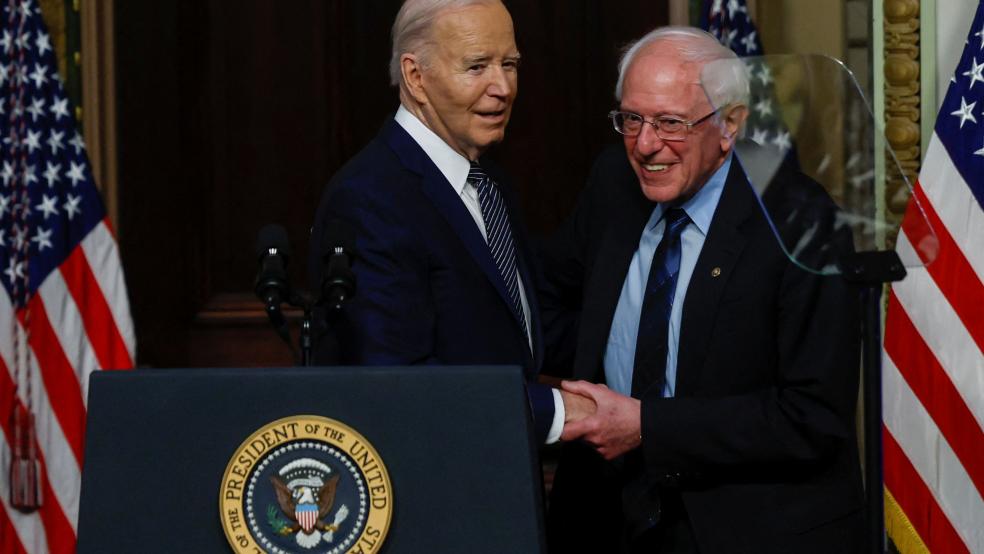President Joe Biden and Sen. Bernie Sanders joined forced on Wednesday to promote the administration’s efforts to lower healthcare costs and prescription drug prices, an issue that the White House expects will resonate with voters and provide a powerful advantage over Republicans led by former president Donald Trump.
“Bernie, you and I've been fighting this for 25 years. Finally, finally, we beat Big Pharma,” Biden said at an event at the White House, referring to measures he signed into law to cap insulin costs at $35 a month for seniors and enable Medicare to negotiate the price of some drugs for the first time. “Not one Republican in the entire Congress – this surprised me, I have to admit to you — not one single Republican voted for it, not one single one, to give us the authority to take on and beat Big Pharma.”
Biden emphasized, as he has before, that the drug price negotiations won’t just save money for millions of seniors but would also save the government $160 billion over the next decade, a number based on Congressional Budget Office estimates. And he repeated his call to expand Medicare price negotiations to 50 drugs a year, up from 10 now being negotiated and 15 or more in future years.
He also touted efforts to cap the costs of asthma inhalers, an issue that Sanders has championed as chairman of the Senate Health, Education, Labor and Pensions Committee. Sanders and other Democrats took aim this year at major manufacturers of inhalers — AstraZeneca, Boehringer, GSK and Teva Pharmaceuticals — for their U.S. pricing, charging it was much higher than in other countries. Biden on Wednesday said that some of the companies “have gotten the message,” with three of the four companies capping the cost for many patients at $35 a month. “There’s some progress going on,” Biden said.
Biden also continued recent efforts to highlight coverage gains made under Affordable Care Act. “Folks, all of our progress is in stark contrast to my predecessor and MAGA Republicans in Congress,” Biden said, blasting Trump for wanting to “terminate” the law as it now stands.
He went on to criticize Trump and congression Republicans for attacks on abortion rights and accused them of wanting to raise the Social Security retirement age and cut Medicare while lowering taxes for the wealthy.
“I’ve got a better idea," Biden said. "I'm going to protect Social Security and Medicare, along with Bernie and other members of Congress, to make sure the wealthy begin to pay their fair share to keep these programs solvent. It's not hard.”
Why it matters: The president is hoping to benefit from a show of support from the progressive Sanders and is looking to make healthcare and lower costs a core issue in his reelection campaign.
Recent polling helps explain why. Take, for example, the new Wall Street Journal poll that made headlines for its finding that Trump leads Biden in six of the seven key swing states in this year’s election.
The poll also found that voters say Trump is better able to handle the economy, inflation and immigration by massive 20-point margins. Biden, by contrast, held a 12-point edge on abortion and, shockingly, just a 1-point advantage on which of the two candidates could better protect democracy.
The Journal poll did not ask about healthcare — a sign of how the issue, once the most pressing for voters, has receded in importance. But other recent polls have found that healthcare costs remain a significant concern. A December survey by KFF, a nonpartisan health policy research group, found that 80% of voters said it is “very important” for presidential candidates to talk about healthcare affordability, second only to inflation. That poll also found that more voters trust Democrats to do a better job handling the Affordable Care Act, with Biden’s party enjoying a 59-39 advantage on the question, including a 61-36 edge among independents.
The same KFF survey also found that only about a third of the public was aware for the new law empowering Medicare to negotiate prices and only about a quarter knew about the $35 insulin price cap or another provision of the Inflation Reduction Act limiting Medicare enrollees’ annual out-of-pocket drug costs at $2,000.
The bottom line: Polls have generally found that voters trust Democrats more on healthcare, a potential advantage for Biden in a race that’s expected to be close. The president is making a concerted push to make more voters aware of his and Democrats’ efforts to lower drug prices, a task made more challenging by the fact that, in some cases, the fruits of those efforts have only recently become visible and in other cases they will take years to get fully implemented.





